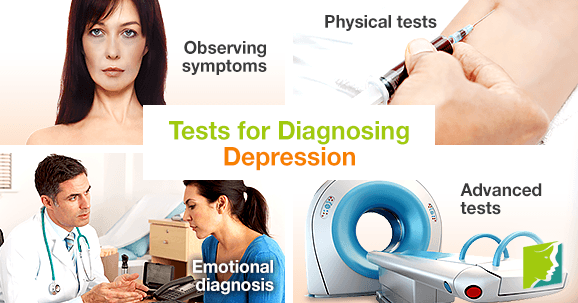Unfortunately, depression is common during menopause. In the midst of all the changes taking place in your body, brain chemistry can become altered as well. When serotonin and oxytocin levels are low, for example, women often develop feelings of sadness and alienation.
It's helpful to know which tests for depression diagnosis are available. This way you know what to expect when you enter the doctor's office. Don't worry, it's very common for people to express this concern to their doctors, and they are prepared to help you in a variety of different ways.
Observing Symptoms
The first thing a doctor will likely do is check for physical symptoms of depression, as well as ask you a few questions. The most obvious symptom is significant weight loss or gain. Often, individuals who are depressed experience a change in eating patterns one way or the other.
Your doctor may ask you about your sleep patterns, as disturbed sleep is a key sign of depression, or if you've been feeling fatigued. You will likely be asked how long you have been experiencing feelings of depression as well as how frequently they comes.
Physical Tests
After they feel there is sufficient evidence for depression, your doctor will likely want to rule out possible physical causes of depression. Certain physical disorders can result in depression, in which case it's not a matter of brain chemistry or lifestyle.
The most common physical causes of depression are menopause, nutrient deficiencies, and hypothyroidism. Blood tests are typical in order to check the levels of your thyroid hormones, sex hormones, and nutrients. They may also check for other disorders of the central nervous system, such as tumors, head trauma, or multiple sclerosis.
Emotional Diagnosis
This step may come before or after the physical tests. You can ask to get a physical test before describing your emotional symptoms if you prefer. The emotional tests involve expressing in depth, out loud or on paper, about how you've been feeling, how often you feel sad, if you have feelings of hopelessness, or if you have trouble concentrating.
They may ask if your daily activities have changed and if you've been keeping up with your favorite hobbies and physical activities. They may also ask as a caution if you have ever experienced suicidal thoughts. Your answers, of course, are entirely confidential.
Advanced Tests
In some cases, doctors may be unable to determine why it is that your symptoms are occurring. If they are suspicious of more serious problems, they may perform advanced tests. To begin, they may perform a CT scan or MRI of the brain to make sure that you do not have a brain tumor. They may also use an electrocardiogram (ECG) to make sure your heart is okay, as well as an electroencephalogram (EEG) to record electrical activity of the brain.
During menopause, you will likely find that the cause for your depression is related to changes in hormone levels. It is natural to feel some emotional lows because of the hormonal imbalance and subsequent unstable brain chemistry. Don't worry too much when you go to your doctor, as they are there to help you, and many treatment options are available.
Sources
- National Institutes of Health. (2014). Depression. Retrieved June 17, 2014, from http://www.nlm.nih.gov/medlineplus/depression.html
- National Institute of Mental Health. (n.d.). Depression in Women. Retrieved June 17, 2014, from http://www.nimh.nih.gov/health/publications/depression-in-women/index.shtml
- NYU Langone Medical Center. (n.d.). Depression Screening Test. Retrieved June 17, 2014, from http://psych.med.nyu.edu/patient-care/screening-tests/depression-screening-test




